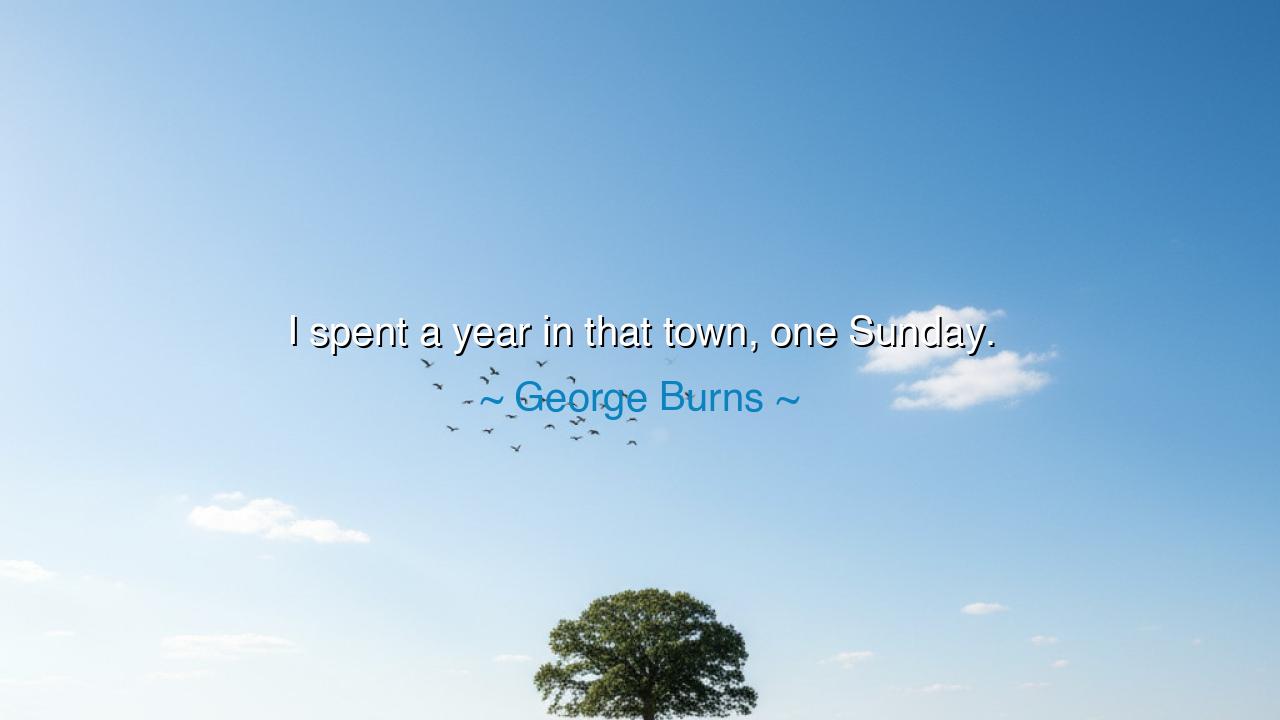
I spent a year in that town, one Sunday.






“I spent a year in that town, one Sunday.” — George Burns
At first hearing, this wry remark by George Burns, the eternal master of understated wit, seems like a simple jest — a clever complaint about boredom, stretched to absurdity. Yet within this quip lies a truth as old as human restlessness itself: the way time changes its nature according to the soul’s feeling. Burns, with a single sentence, captures the strange elasticity of life — how a single day can feel like a lifetime when one is trapped in tedium, and how joy can make years pass like moments. Beneath the laughter, the words remind us of the eternal human struggle against monotony, and of the sacred art of finding light in long, empty hours.
The origin of this quote springs from Burns’s own life as a traveling performer, one who had seen countless towns across America’s heartland in the early days of vaudeville. For him, the phrase was likely born from real experience — a day spent in some sleepy place where time seemed to stop, where even the clock’s hands moved with reluctance. Yet his humor transforms frustration into insight. He does not curse the slowness of life, but laughs at it — for laughter, as Burns always knew, is how one wrests meaning from monotony. The ancients might have called this the philosopher’s laughter, the ability to see folly, weariness, or emptiness and yet smile through them.
Time, to the ancients, was never a single thing. The Greeks named two forms of it: Chronos, the time of the ticking clock, and Kairos, the time of experience and feeling. Burns’s saying speaks of the tyranny of Chronos — those endless, dragging hours that stretch when the heart is unstirred. When life lacks purpose or presence, even a single Sunday can feel like a year. But behind his jest lies the wisdom of the opposite truth as well: that with meaning, love, or laughter, even a year may pass as lightly as a day. Thus, the humor conceals a paradox of time itself — that its weight depends not on its length, but on the spirit that lives within it.
The ancients told of Sisyphus, doomed by the gods to roll a boulder up a hill for eternity. To him, each moment was the same — endless repetition, without change or purpose. But Albert Camus, the modern philosopher, later said that we must imagine Sisyphus happy — for even in monotony, man can find defiance, can choose his own meaning. Burns, in his lighthearted way, teaches a similar lesson. To say he spent “a year in that town, one Sunday” is to laugh at life’s Sisyphean hours, to transform weariness into wit. The laughter becomes the victory; the joke itself, a rebellion against boredom.
And yet, there is tenderness in the humor — for Burns was not mocking the small town itself, but the feeling of stagnation that can settle upon any soul. We have all known such Sundays — those hours when the world feels still and colorless, when time itself seems to hold its breath. In such moments, laughter becomes not mockery, but survival. To laugh is to reclaim the day from the slow grind of existence, to remind ourselves that time, however long or dull, is still ours. Burns’s wisdom, wrapped in jest, is that attitude transforms time — that the spirit, not the sun, determines the length of the day.
History gives us many who learned this art. Nelson Mandela, imprisoned for 27 years, once said that he survived because he kept his mind free, his humor intact, his dignity unbroken. Those years, though countless in number, did not consume his soul because he found purpose within them. Mandela turned a prison cell into a school, a place of patience and growth. To him, time became his servant, not his master. In the same way, Burns’s jest teaches that the human mind can reshape its experience of time — that even the longest “Sunday” can be redeemed through wit, hope, or laughter.
So, my child, take this teaching into your own life: beware of the days that feel like years, for they are the sign of a restless or neglected spirit. When boredom lengthens your hours, do not curse the clock — awaken the mind. Find meaning in small things. Speak, laugh, create, move, or simply breathe with awareness. Time bends to the rhythm of your attention. The wise do not flee slow days; they transform them.
And if ever you find yourself in some quiet town, on some endless Sunday, remember George Burns, the old sage of humor, who turned weariness into laughter. Smile, and say to yourself, “I have spent a year in this day.” For to laugh at time is to master it — to turn the heaviest hour into something light, and to live, even in stillness, with the spirit of one who knows how to make eternity bearable.






AAdministratorAdministrator
Welcome, honored guests. Please leave a comment, we will respond soon